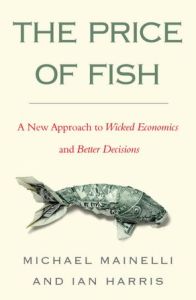Join getAbstract to access the summary!

Join getAbstract to access the summary!
Michael Mainelli and Ian Harris
The Price of Fish
A New Approach to Wicked Economics and Better Decisions
Nicholas Brealey Publishing, 2011
What's inside?
Economics can be juicy and interesting. Really. Honest. Would we lie?
Recommendation
This is the book for students who rolled their eyes as the economics professor doggedly scribbled supply-and-demand curves on the board. Scientist Michael Mainelli and accountant Ian Harris didn’t buy that dry drivel, either. Economics as a discipline has much to offer, they argue, but it falls far short of explaining why people behave the way they do. The authors use the ingenious example of commercial fishing: If humans were as all-knowing and rational as economists say, why would commercial fisheries continue to harvest fish stocks to depletion? Mainelli and Harris make a good argument – backed by a sometimes-confusing hodgepodge of studies, cases and examples – that the right economic decision for an individual isn’t the right decision for everyone. They offer an alternative theory of “real commerce” – a study of human motivations that includes economics but dismisses the idea that anyone makes perfectly informed, perfectly logical decisions. getAbstract recommends their work to readers seeking new financial fish to fry.
Summary
About the Authors
Michael Mainelli, professor emeritus of commerce and a fellow at Gresham College, and Ian Harris, chairman of BCS The Chartered Institute for IT’s Ethics Group, founded Z/Yen, a commercial think tank in London.

















Comment on this summary